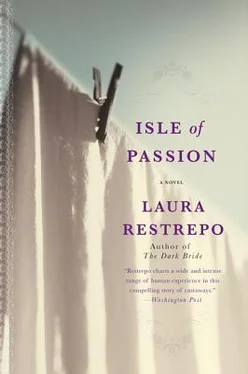While gold fever made the men search for jewels and ancient coins even in the toad’s bellies, the women, brandishing brooms, mops, feather dusters, brushes, bottles of lye, and pieces of soap, were busy cleaning up the tidal debris brought in by the storms. In spite of being pregnant, Alicia was at the head of the cleaning brigades and more energetic than ever.
She did not suffer from morning sickness, nor was she sleepy or depressed. The whims of her pregnancy took into account the prevailing limitations of their isle: she could feel compelled to drink coconut milk at any hour, and she enjoyed being alone for long periods of time in the least hostile cove of the beach, sitting at the shore and feeling the tame waves caressing her belly after crashing against the rocks and turning into white foam.
Doña Juana, the midwife, had already performed the needle test, the tape measure test, and the cup of coffee test, and, according to all of them, the baby was a girl. Ramón was saying the same thing, based on what his medical books stated as to the size and height of her pregnant belly.
Against all evidence, Alicia was convinced otherwise. As if she could see inside herself, she knew it was a boy. She knew even more: the exact color of his eyes and hair, and the perfectly round shape of his head. She was sure that his name would be Ramón, that he would be a short, sweet boy, and that by an uncanny communion, his joys and sorrows would fluctuate — just as was happening already — in perfect harmony with hers, for years after he was born.
According to Ramón’s calculations, the ship should be back in May, which would give them enough time for a trip to Orizaba. In that way, the June delivery and the baby’s first month could be properly attended by doctors and relatives.
“This baby is going to be born in Clipperton,” Alicia assured him.
“I have told you a thousand times not to say that,” he answered. “Colonel Avalos gave me his word of honor that this time there will be no delay. He knows about the impending birth, and he is not going to fail us.”
“Then I don’t know what is going to happen,” she insisted, “but I know that this baby is going to be born in Clipperton.”
Thoughts of her own child, whose presence was becoming more and more tangible, made Alicia aware for the first time of the existence of other children on the isle. She had looked at them before without seeing them, and suddenly, like creatures coming out of the sea, they were there, all of different ages and races, running around among the crabs and the booby birds. That was when she decided to take care of the school and to dedicate most of her time to it. On the beach, next to Brander’s house, they built a small open shelter with a thatched roof, and there they sat the children — nine in all — around a long table. The oldest one, twelve years old, was Jesusa Lacursa, Daría Pinzón’s daughter. Soon, the youngest one was to be a small, sweet child, always clinging to his mother’s skirts, Ramón Arnaud Jr.
By then the women began to put aside their private jealousies and gossiping, and to weave a tight solidarity circle, a secret feminine group that was not ever going to dissolve and that, years later, would allow them to survive during the ominous times in which they were to go through hell.
It was not their domestic chores that united them, or the school, or the sewing and embroidery workshops. It was the collective care of their hair, which became a weekly ritual. All of them, without exception — Alicia, Tirsa, Doña Juana the midwife, and the camp followers — had, reaching to their waists, splendid long tresses that had not been cut since their infancy. Except of course for the trimming ritual on Saint John’s feast day, when the moon’s influence pulled the hair sap in toward the roots and the tips could be trimmed without major damage.
Every Wednesday at dawn they would gather around the washing sinks to rinse their hair with rainwater in clay vessels left exposed to the stars overnight. To counteract the lightening effect of the sun’s rays, they applied chiles mixed with aromatic herbs. To neutralize the drying effect of the salt spray, they applied a poultice of booby eggs. To strengthen their hair, they massaged it with Barry’s Trichoferus or snake oil; to perfume it, they sprinkled a few drops of vanilla. They rinsed it again and wrapped a shawl around their heads, pulled some chairs out in the sun and sat there to let it dry. Then the women brushed one another’s hair for hours and later, with wooden or bone combs, pulled it back so hard that their eyes seemed slanted. After braiding their hair in strands of three or four, they tied it with colored ribbons. On Saint John’s feast day, they trimmed their hair and carefully collected the cutoff tufts into little bags to be placed under their own pillows.*
During these long sessions of hair care there was more than enough time to talk. They chatted about births and miscarriages, about love and deceit; whole family sagas were told, and stories of past battles and of other battalions were remembered.
By the end of March or beginning of April when dozens of black fins began to appear in the waters around the reefs, the topic of sharks displaced all others, becoming obsessively frequent. The women tried to outdo one another with stories about isle inhabitants who had died in the jaws of sharks. Like the one about the nine fishermen who left at dawn on a barge, and only a big splash of blood in the water returned, dragging itself onto the sandy beach and staying there, forever indelible. Or about the effeminate gringo working for the guano company who, while getting a suntan close to shore one day, lost both his buttocks in one shark’s bite.
“That was God’s punishment, taking away his sinful body part,” Doña Juana used to say, crossing herself.
While they talked, they looked into the distance at the metallic gleams of the sharks’ backs, listened to the noise they made with their fins, cutting through the water like razor blades. The women believed they could detect fetid breath coming out of their jaws. At night they had nightmares of fangs and mutilations, of spooks that took the children away, of sharks that forced themselves sexually upon the women or came out of the ocean in human form in order to commit some atrocity.
On Wednesday mornings, brushing their hair together, the women exorcised their fears by telling these stories, which up to then were only dubious memories and horrible dreams, impossible in the real world.

ALICIA WAS SWIMMING, gliding through the warm-water currents, which seemed to open like transparent blue curtains in her path. Her contact with these liquid barriers was unrushed and pleasurable, and it made her feel good. Many feet above her head she could see a sheet of silver, the sleek, shimmering surface. The sun hitting on the water from above made it appear metallic, like warm light beaming on a mirror.
She perceived a ceaseless, soothing gurgling sound, like a pot bubbling on the stove. She felt bubbles tickling her throat, an effervescence coming up to her ears and caressing her timpani. The peaceful rhythm of the ocean lulled her and kept her company like the heartbeat of an enormous creature, an invisible protector, a powerful but docile beast. Alicia dived down, and looking up into the distance above, she saw the brilliant surface and knew she did not need to come up to reach it. She walked slowly underwater, without fear, without shortness of breath. Her breathing was deep and serene, her lungs expanding with the warm breath of the big animal. Her heart and that of the beast beat together. Everything was all right, translucent. Everything was peaceful and safe.
Читать дальше













